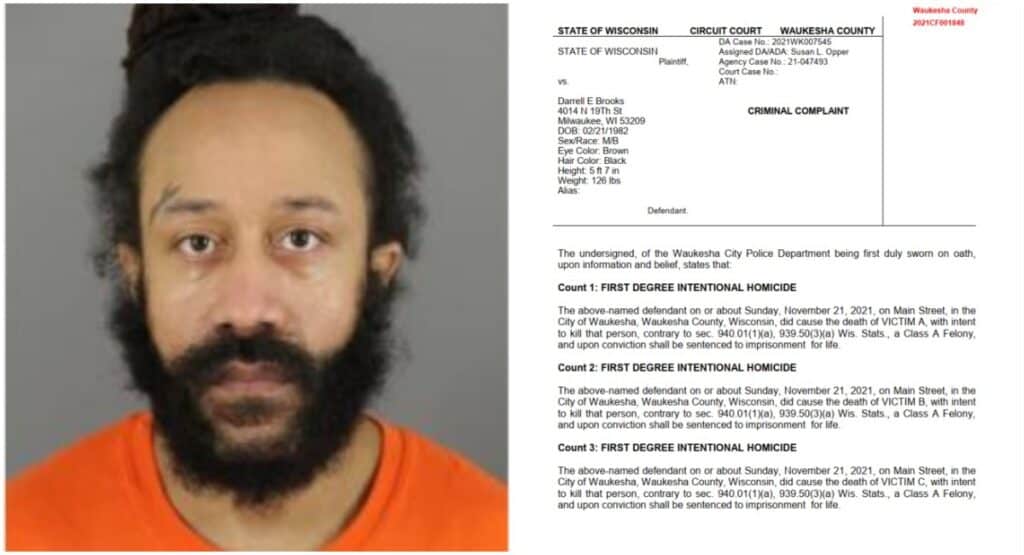Our criminal justice leaders are supposed to protect us. They failed. It’s not just John Chisholm’s fault Darrell E Brooks was allowed to prey on more victims. There are several people to blame. In this exclusive investigation, WE NAME NAMES.
The national outrage over the fact Darrell E Brooks was free on the streets to attack the Waukesha parade has focused on Milwaukee County District Attorney John Chisholm.
Wisconsin Right Now led the charge in exposing Chisholm’s record on refusing to process felony cases, including serious gun cases. We’ve warned nearby communities that they are not immune from Milwaukee crime. Crime is like cancer; if not stopped, it will only spread.
But a Wisconsin Right Now investigation into Darrell E Brooks reveals that Chisholm is only one piece of the puzzle that contributed to the massacre; there are many other court officials, both in Waukesha and Milwaukee Counties, who bear responsibility – and arguably MORE – for the fact Darrell E Brooks remained free, despite his excessively long criminal history.
Questionable decisions were made by former public defenders named to court commissioner positions. We found a backlogged and inefficient criminal justice system in which counties don’t talk to counties, states don’t talk to states, and court officials prioritize the Delta variant over getting repeat criminals off the streets.

These are the officials who bear some blame for Darrell E Brooks being on the streets:
1. Wisconsin Attorney General Josh Kaul and his assistant attorney general, Jacob Corr; Brooks had two felony cases in Milwaukee County that were pending when the parade attack occurred; they represented two chances to get him off the streets. In the first case, a 2020 shooting, Judge David Feiss reduced Brooks’ bail to $500, resulting in him going free. Jacob Corr was the state prosecutor who appeared in court for the bail hearing. Records show the state offered Brooks a deal; Corr’s boss, Josh Kaul, won’t say what it was. Chisholm fell on his sword over his assistant’s bail recommendation in Brooks’ other pending felony, but Kaul has said nothing about Corr. His involvement in the case has completely escaped the media radar.
2. Milwaukee County Court Commissioner Cedric Cornwall, for setting Brooks’ bail at a measly $1,000 in the more recent pending felony case on Nov. 5, just over two weeks before the parade attack. In that case, Brooks was accused of running a woman over in a gas station parking lot. (We would note that Corr did not file bail jumping charges in the 2020 case when Brooks was accused of committing the new felony at the gas station even though he had several weeks to do so.)
3. Waukesha County Court Commissioner David Herring. Brooks also had a separate Waukesha paternity/child support case that could have gotten him off the streets. But Herring refused a request from a state child support attorney (Waukesha’s Daniel Sielaff) to jail Darrell E Brooks just five days before the parade attack, despite Brooks’ extremely poor history in the case.
4. Milwaukee County Circuit Judge David Feiss, who reduced Darrell E Brooks’ bail to $500 in the shooting case that Corr was prosecuting when the court system couldn’t meet his speedy trial request. Prosecutors recommend bail, but judges or court commissioners set it, so this one is ultimately on Feiss.
5. Milwaukee County Chief Judge Mary Triggiano, whose failed management of the court system post-COVID has resulted in a two-year backlog and 350 backlogged jury trials as of September 2021 – one of them Brooks’. If Triggiano had prioritized public safety as much as the Delta variant, Brooks would have been tried, and possibly kept off the streets.
6. Milwaukee County DA John Chisholm and his assistant prosecutors, Michelle Grasso and Carole Manchester. Manchester argued for an “inappropriately low” bail amount for Darrell E Brooks in the gas station case, Chisholm admitted, contributing to Cornwall’s decision to set Brooks’ bail at $1,000. “The State made a cash bail request in this case of $1,000, which was set by the court. The defendant posted $1,000 cash bail on November 11, resulting in his release from custody,” Chisholm said in a statement. “The State’s bail recommendation, in this case, was inappropriately low in light of the nature of the recent changes and the pending charges against Mr. Brooks.”
But it was Grasso’s case; she was the one who chose to recommend the $1,000 in the case, Chisholm told a county board committee. She was in the middle of a jury trial so Manchester handled the hearing.
It’s a pattern. WTMJ-TV investigated “all the 2021 domestic abuse cases assigned to the same ADA assigned to Brooks’ case and found dozens of cases where bail was set under $1,000, including 45 felonies. We also found 16 cases where the bail was set above $5,000.” They didn’t name the ADA.
Our Deep Dive
Wisconsin Attorney General Josh Kaul & Assistant Attorney General Jacob Corr
Many questions remain about the actions of AGA Jacob Corr when it comes to Brooks’ pending case from 2020, but his boss, Josh Kaul, has not been forthcoming with the public.
What did Corr request for bail? Did he request that the $500 be raised after, court records say, Darrell E Brooks violated his pretrial supervision conditions? There’s no evidence of it in online court records; we will be pursuing the file after Thanksgiving.

Furthermore, bail jumping charges in the earlier pending case were not filed against Brooks when he was accused of new felonies in early November 2021, just weeks before the parade attack.

Online court records show that the state – i.e. Jacob Corr – was making “offers” to Darrell E Brooks that he rejected and then accepted in the months leading up to the parade attack. Corr’s LinkedIn page confirms he’s an assistant attorney general with the state Department of Justice.
Corr started appearing in the Darrell E Brooks’ case starting in October 2020 through at least August 2021 and appeared in court for the state during the $500 bond hearing; this story confirms he still worked for Kaul as of late October 2021, during the time frame of the Brooks’ bail hearing, and his LinkedIn page says he’s still there.
We asked Corr and Kaul, via his spokesman, these questions:
What amount did Corr recommend for bail? Was it appropriate? Did Corr argue for a specific bail amount in other appearances/dates in this case? If so what and when and was it appropriate? Why was Corr handling this case? What role did AG Kaul have in this case, these bail recommendations?
Why did Corr not argue against the $500 bail reduction or did he? The court records say the state made Darrell E Brooks an offer and at one point there was a plea/sentencing date set (canceled when Brooks reoffended). What was the offer from the state to Brooks in this case? Was it appropriate? Why did the state/Corr/your office not file bail jumping charges against Brooks when he was accused of new felony charges on Nov. 5, 2021 while out on $500 bail in this case? Why did Corr not file a motion to raise bail after that new offense?
We haven’t heard back.
 Furthermore, it turns out that Darrell E Brooks was wanted on a warrant for being a non-compliant sex offender in Nevada for five years before the Waukesha parade attack. KOLO-TV reported: “Apparently the regional sex offender unit recently learned he might be in Wisconsin, but lacked an exact location.” Shouldn’t Wisconsin officials have figured this out?
Furthermore, it turns out that Darrell E Brooks was wanted on a warrant for being a non-compliant sex offender in Nevada for five years before the Waukesha parade attack. KOLO-TV reported: “Apparently the regional sex offender unit recently learned he might be in Wisconsin, but lacked an exact location.” Shouldn’t Wisconsin officials have figured this out?
Milwaukee County Court Commissioner Cedric Cornwall

Much has been made about Chisholm’s assistant prosecutor recommending low bail for Brooks in the pending case in which he is accused of trying to mow a woman down in a gas station parking lot only a few days before the Waukesha parade attack.
However, as noted, the DA only recommends bail.

Milwaukee County Court Commissioner Cedric S. Cornwall made the decision to set Brooks’ bail at a measly $1,000 on Nov. 5, 2021. Brooks posted the bail on Nov. 19. The parade attack was on Nov. 21.
According to Ballotpedia, Cedric Cornwall previously served “as the Manager for the City of Milwaukee Equal Rights Commission and in the Trial Division of the Office of the Wisconsin State Public Defender.” He was previously a partner in the Law Offices of Cornwall, Rhiel, and Yamahiro (for those keeping track, that’s the law firm of Glenn Yamahiro, a former public defender turned judge who outrageously found probable cause that Officer Joseph Mensah committed homicide in a years-old shooting case – despite a glaring conflict of interest).
Cornwall once ran for judge and lost. He was named a court commissioner anyway.
According to Fox News, he was appointed in 2005 and serves at the pleasure of the chief judge. Fox reported that, on the same day he set Brooks’ bail at $1,000, Cornwall also set bail at $500 for a man accused of “strangulation, battery and domestic violence,” and, the day before, he set bail at $1,000 for a woman facing felony child abuse charges.
Waukesha County Court Commissioner David Herring

Waukesha County Court Commissioner David Herring could have kept Brooks off the streets also during a Nov. 16, 2021, hearing, but his decision not to do so is being overshadowed by the Milwaukee cases. Herring rejected a request from an assistant Waukesha County corporation counsel to give Brooks a 120-day jail sentence on Nov. 16, which would have kept Brooks off the streets the day of the parade. This is despite the incredibly tangled history in that case; Waukesha officials gave Brooks chance after chance after chance.
Herring has been a court commissioner since only February 2020. Before that, he was a public defender for 2 years and he was in private practice. He also served as an intern in the Waukesha County DA’s office.
The case started as a paternity action, and turned into an extended child support case; it dates back to 2004. Here’s what happened during the lead up to the parade date:
On Feb. 26, 2021, there was a return on a warrant against Darrell E Brooks that was signed in 2015 by Waukesha County Judge Paul Bugenhagen. A hearing was held. Brooks appeared by phone. Commissioner David Herring quashed the warrant for Brooks and scheduled a March order to show cause hearing. Brooks was released on his own recognizance. The public defender’s office appointed counsel for Brooks. The state filed payment records. The issue: His chronic non-payment of child support.
On March 26, 2021, a hearing was held that Brooks attended. Attorney Nicole Brandemuehl, representing the state child support agency, requested a finding of contempt. Brooks’ attorney Cassandra A. Miller asked that he be given additional time to pay child support. Court Commissioner Daniel Rieck imposed a jail sentence but stayed it.
“The non-custodial parent is found in contempt for failing to pay child support and failing to provide a valid reason for nonpayment. The non-custodial parent is sentenced to 120 days in the Waukesha County Jail with Huber privileges, release for employment and job search only. The sentence is not imposed today but will be imposed if at any time during the next 24 months the non-custodial parent fails to make monthly payments in full,” the court records say.
Darrell E Brooks did not take advantage of this chance. On July 19, 2021, Brandemuehl filed a letter asking to lift the stay of the jail term, meaning that Brooks would have to serve it. The state attached his payment history.
On August 2, 2021, Rieck signed an order to lift the stay and impose the jail sentence. But Brooks couldn’t be found, so a warrant was issued.
Brooks was back in a Waukesha courtroom for a hearing on Nov. 16, 2021, just DAYS before the parade attack in that same community. Now the commissioner was David Herring again, though, and he took a different stance than Rieck. He let Brooks walk again.
Darrell E Brooks appeared by phone. Attorney Sielaff appeared for the state Child Support Agency and asked for the jail sentence to be imposed. Attorney Luis Gutierrez appeared on behalf of Brooks’ lawyer, Miller, and asked for additional time to allow him to provide a defense. Herring decided to cancel the warrant, keep the jail sentence stayed, and schedule another hearing because Brooks claimed he had been incarcerated in Georgia.
The court records say, “Mr. Brooks provides the Court with additional information as to when he was incarcerated as he served a six month sentence out of State and that was the reason for non-payment. Attorney Sielaff leaves it in the Court’s discretion whether or not to set this matter for review. Court quashes capias. Darrell Brooks released on his own recognizance. Court reinstates the stay and will set this matter for review. The Court will allow for Attorney Miller to provide information regarding Mr. Brooks’ current incarceration at the next hearing. The Court is requiring confirmation that Mr. Brooks was in custody in Georgia. Order to show cause hearing scheduled for December 22, 2021 at 02:45 pm.” (We left a message for Sielaff but didn’t hear back.)
Of course, before that review could happen, prosecutors say, Brooks was leaving a trail of carnage behind him at the Waukesha Christmas parade.
The Georgia arrest is very curious.
Waukesha County DA Sue Opper brought up the possibility of a Georgia incarceration at Brooks’ initial appearance in the parade attack. But it’s all very vague. She stated in court, “In Georgia, your honor, the record reflects a May 2021 arrest for misdemeanor battery with a designation of family violence. While it is not clear if he was convicted, he did recently remark to a court official in this county that he had served a six-month jail sentence in Georgia. We have not been able to verify if that was a conviction but certainly, there was confinement in conjunction with that arrest.”
It’s unclear why Waukesha County’s top prosecutor was unable to figure out whether Brooks was convicted in a case this serious. We ran Brooks’ name in Georgia’s court records site, PeachCourt, but didn’t come up with anything. That would require criminal charges though. It’s not possible for the public to run a statewide Georgia arrest history in non-felony cases. We contacted Atlanta police and Fulton County courts to see whether such an arrest occurred there, but we didn’t hear back.
However, could Brooks have served a six-month sentence after May 2021? He was periodically appearing in court in Wisconsin on other cases during that time frame, which CCAP shows. For example, he appeared in one of his Milwaukee felony cases on June 21 and August 31, although it was by video. He was under the supervision of JusticePoint in Wisconsin during this time frame.
Herring’s decision to let Brooks walk – again – is even more astonishing because of the long history in the case. Here’s just some of it:
Way back in 2005, there was a warrant issued to bring Brooks before the court. That same year, Court commissioner Thomas Pieper, of Waukesha County, issued a warrant again for Brooks and a default order, sentencing him to 120 days in the County Jail with Huber release. It’s not clear whether he ever served it. There was a notice for income withholding from Sparks Nugget Inc. in 2006, indicating he was in Nevada (where he became a registered sex offender).
In 2009, there was a lock up hearing. Brooks was in court, and the court quashed the warrant. Regarding the jail sentence, records say, he was “released on his own recognizance” by Court commissioner (now judge) Laura Lau.
What followed that year was back and forth actions – a 120-day jail sentence, another warrant, he was released after a warrant was quashed, another warrant was issued, he was ordered to serve 45 days, and his Huber privileges were revoked.
In 2010, attorney Sielaff, signed by Lau, filed an affidavit for contempt against Darrell E Brooks. By December, unable to reach Brooks, the state requested a due diligence warrant, which Lau issued. By September 2011, he was back in court, the warrant was quashed, and he was released by Lau.
Court records during this time frame periodically mention that he was incarcerated off and on for other crimes. By 2013, the state was ordering him to show cause. Lau found him in contempt for not paying child support without a valid reason and sentenced him to 120 days in jail.
A couple months later the state requested the court impose a previously stayed jail sentence for Brooks, and Lau signed it. In 2013, another warrant was issued for Darrell E Brooks. In 2014, there were more orders and petitions for contempt and to stay them. In 2015, there was another due diligence warrant because of non-service. The records say “NO BAIL” and indicate he was supposed to be brought before the court. A bench warrant was again issued. By 2016, mail wasn’t being served.
The file was destroyed in 2019, but the records pick back up in February 2021.
Judge David Feiss

Milwaukee County Circuit Judge David Feiss bears some responsibility too. Brooks had another pending felony case in Milwaukee County at the time of the parade attack. This one was for allegedly shooting at a car containing a relative during an argument. That’s the 2020 case we’ve been describing.
Feiss reduced Brooks’ bail to $500 in that case, which was so low it allowed him to go free. Court commissioner Alexis Liggins initially set Brooks’ bail at $10,000 in the case, court records show. Feiss reduced it.
Who is David Feiss? He was a veteran prosecutor in Chisholm’s office before being elected to the bench six years ago.
Here’s what happened.
In August 2020, Darrell E Brooks requested a speedy trial (which is a right under the 6th Amendment to the US Constitution). That same month, Feiss reduced Brooks’ bail to $7,500. A speedy trial was scheduled for November 2020. But it didn’t happen. In November, the state (Corr) made an offer to Brooks, but he rejected it. On Nov. 30, the speedy trial didn’t happen; “defendant is not available for today’s hearing due to COVID-19,” the court records say.
A speedy trial was scheduled instead for February 2021. But that didn’t happen either. “The court is unable to honor the speedy trial demand in this case,” the records say when February rolled around. As a result, Feiss reduced Brooks’ bail to $500 in a hearing Corr attended. Brooks posted bail and was free again. By March 2021, he had a violation report with JusticePoint, which is pretrial supervision. But his bail remained $500.
Darrell E Brooks was back in court in late June 2021, but the court STILL could not give him a trial. “Due to court congestion, Court is unable to hear jury trial at this time,” the records state. In August, the state (Corr) made an offer, and a plea-sentencing hearing was scheduled for Nov. 11, 2021. But the day before that hearing, the court learned that Brooks was in custody on a new felony case – the case involving the mowing down of a woman in a gas station parking lot, for which he was released on $1,000 bail in another courtroom by Cornwall. So when Nov. 11 rolled around, the defense requested an adjournment, which was granted.
Nothing else happened on that case until after the parade attack. Darrell E Brooks was never charged with bail jumping and no move was made to raise his bail.
Milwaukee Chief Judge Mary Triggiano
David Feiss reduced Darrell E Brooks’ bail in the serious felony case to a ridiculous $500. However, the record above shows he did so because the congested court system was unable to meet Brooks’ constitutional right for a speedy trial.
Thus, it’s important to consider the court official most responsible for managing the court system’s response to COVID-19, and that brings us to Milwaukee County’s Chief Judge Mary Triggiano.
In September 2021, Wisconsin Right Now exclusively reported that, according to an interview with Triggiano and what she told a County Board Committee, the Milwaukee County Court System was operating with a two-year backlog in felony cases. This was resulting in delayed jury trials. Indeed, at that time, Triggiano told us that there was a backlog of 350 jury trials in the court system. We didn’t know it at the time, but Brooks’ 2020 case was one of them.
This was a result of choices – choices to limit the number of courtrooms that could be opened to handle jury trials, which can’t be handled via zoom. While the limitations were understandable in the initial days of the pandemic, Milwaukee’s chief judge had switched to expressing concerns about the Delta variant by September 2021, and that was well after the vaccine.
We wrote then: “The chief judge acknowledged that some criminal cases have been dismissed because of the delays, noting that sometimes witnesses and victims vanish when cases languish…’We’ve taken this pandemic very, very seriously, as well as we should, including the variants…we’re being very careful,’ Triggiano told the Board committee. She likened the court system’s ‘recovery efforts’ to a ‘dimmer switch,’ where the system goes back to normal gradually, not all at once.”
Triggiano told the County Board committee that she was considering bringing in national experts to help the courts get a handle on the backlogs. “We will continue to meet with them to develop a better process to deal with those cases…with the backlog,” Triggiano said at the Board meeting.
Too late. Milwaukee County is prioritizing the COVID protocols over keeping repeat violent criminals off the streets. Which is causing more harm?
Triggiano said that COVID-19 was to blame for the backlogs because, until Sept. 7, 2021, the courthouse was still operating in person in a very limited capacity, with only a few courtrooms open for jury trials and the like. There were 1-2 courtrooms for in-person cases.
“We needed to keep people safe and protect lives,” she said. They were set to open but then the Delta variant hit, so there were still some limits, she said in September 2021. The judges were back, but only certain courtrooms are “big enough to keep people safe,” so there were still limits, she said, causing backlogs to worsen.
Milwaukee County District Attorney John Chisholm
Chisholm fell on his sword, but he tried to paint his assistant’s low bail recommendation as an aberration. “The State’s bail recommendation, in this case, was inappropriately low in light of the nature of the recent changes and the pending charges against Mr. Brooks,” he wrote.
“The bail recommendation in this case is not consistent with the approach of the Milwaukee County District Attorney’s Office toward matters involving violent crime, nor was it consistent with the risk assessment of the defendant prior to setting of bail.”
We rounded up all of the ways that the low bail amount was EXACTLY CONSISTENT with Chisholm’s weak approach toward matters involving violent crime. Read more about that here.
Assistant District Attorneys Michelle Grasso & Carole Manchester
Who appeared in court for Chisholm’s office during the initial appearance where the $1,000 bail was set by Cornwall? Carole Manchester, according to court records. The Journal Sentinel also confirmed she was the attorney for the state at the bail hearing. The only photograph to emerge of Manchester is a screenshot showing the back of her head.
But it was Grasso’s case; she was the one who chose to recommend the $1,000 in the case, Chisholm told a county board committee. She was in the middle of a jury trial so Manchester handled the hearing.

Table of Contents







![Protecting Portland: No Good Deed Goes Unpunished [REVIEW]](https://www.wisconsinrightnow.com/wp-content/uploads/2025/07/portland-356x220.jpg)























